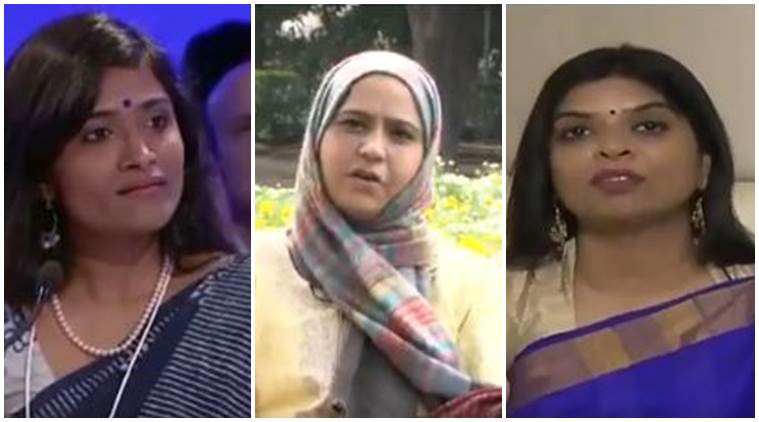 Malvika Iyer, Arifa, Kalpana Ramesh — three of the seven women who handled the social media accounts of Prime Minister Narendra Modi on Women’s Day.
Malvika Iyer, Arifa, Kalpana Ramesh — three of the seven women who handled the social media accounts of Prime Minister Narendra Modi on Women’s Day.
FROM A crafts exponent in Kashmir to a motivational speaker from Chennai who lost her hands to a grenade blast. From a former sarpanch in Maharashtra to a mushroom farmer in Bihar.
They were among the seven women who got to take over Prime Minister Narendra Modi’s social media accounts, with a total of over 137 million followers, on International Women’s Day — six days after he posted a teaser that he was “thinking of giving up” the accounts on Sunday.
The Indian Express tracked down each of them: Malvika Iyer, a grenade blast survivor and disabilities rights activist; Sneha Mohandoss, founder of Foodbank India; Arifa Jan, founder of Namda Handicrafts in Kashmir; Kalpana Ramesh, a water conservation activist in Hyderabad; Vijaya Pawar, a Banjara traditional crafts expert from Maharashtra; Kalavati Devi, who led efforts to build toilets for women in Kanpur; and, Veena Devi, a home farmer who became village sarpanch.
‘Family is inspiration’ — Malvika Iyer, 31
In 2002, when she was 13 and living near an ammunition factory in Bikaner, a fire and explosion scattered material all over the area. Six months later, she picked up an unexploded grenade she found in her yard. The grenade exploded, blowing off her hands. Iyer is now a Global Shaper with the World Economic Forum, a disability rights activist and a motivational speaker.
“I was bedridden for two years. But no one in my family ever said ‘bechari ladki’. My family’s attitude was my inspiration and this is the attitude I speak about in my motivational talks,” says Iyer, who holds a PhD on how disabled people are perceived.
‘Home is my workplace’ — Sneha Mohandoss, 27
A resident of Chennai, she founded FoodBank-India, an initiative that promotes cooking an extra meal every day for the needy. Today, she coordinates with over 500 volunteers from across the country who are part of 18 chapters of her initiative.
Started in 2015, FoodBank-India’s Facebook page gained popularity the same year for its relief work in flood-hit Chennai. Driven by social media, with no office or vehicle, her team also maintains a database of orphan children to celebrate their birthdays. “My home is where I store all necessary items for the work,” said Mohandoss, who did her graduation in visual communication and postgraduation in social work.
‘He said things will be fine’ — Arifa Jan, 33
A Srinagar resident, she got the Nari Shakti Puraskar for her contribution to the revival of Namdah — a traditional rug from Kashmir. After completing her studies in 2012, Arifa decided to stay on in Kashmir. “I started my firm Incredible Kashmir crafts. My focus has always been the revival of Namdah,” she says. On Saturday, Jan said she met Prime Minister Modi, narrated her story and also told him how business suffered due to the Internet shutdown. “He listened and said things will be fine in the future,” she said.
‘No more water in tankers’ — Kalpana Ramesh, 50
An architect, Kalpana is known in Hyderabad as the “water warrior” for her efforts to conserve water, harness rainwater, encourage recycling, and save lakes and ponds. When she returned to India from Boston eight years ago with her husband, they decided to build an ecologically sustainable home with rainwater harvesting and water treatment. She later extended them projects to the gated community she lived in. “When we came, everyone used to get water through tankers. In four-and-a-half years, no one in the community has got water from tankers.”
‘Hope this helps fellow women’ — Vijaya Pawar, 36
A resident of Ambejogai in Maharashtra’s Beed, she is the president of Harappani Gorbanjara Mahila Kala Vikas Mandal which works to preserve and promote the traditional art and culture of the Gor Banjara community she belongs to.
A graduate in Arts, Pawar said she set up the organisation in 2004 along with her husband Dr Shriram Pawar. “The Gor Banjara culture has made an impact on the ancient cultures of the world and has a history as old as the Indus Valley civilisation. We felt there was a need to preserve this and ensure that we also create livelihood opportunities for the community,” she said.
Referring to her presence on the PM’s social media accounts, she said: “I hope this recognition helps me fulfil my dream of ensuring that women from my community don’t have to work for a pittance at sugar factories.”
‘Started as a mason’ — Kalavati, 55
A mason who works to build community toilets in Kanpur’s slums, Kalavati was married when she was a teenager and could not obtain an education. “She started working as a mason soon after marriage and realised the importance of toilets after seeing the conditions in the slum she lived. She got associated with an NGO Shramik Bharti and worked on building toilets in Kanpur’s slums,” said her son-in-law Sukhendra Singh, who lives with her. Kalavati has also travelled to Punjab and Barabanki for training on how how to build community toilets.
‘Persisted when others stopped’ — Veena Devi, 43
In 2013, she was among a dozen women who received training in mushroom cultivation from Sabour Agriculture University, Bhagalpur. Her husband Krishnakant Singh, a farmer, that she persisted while other women of the village could not continue. As Dhouri panchayat sarpanch between 2011 and 2016, she took it as a challenge to show the way. “She has been training mushroom farmers of Tarapur, Khargpur, Dharhara and Asarganj. We are proud that Veena has been recognised as an agent of change,” he says.
(Inputs from Esha Roy/Delhi, Sreenivas Janyala/Hyderabad, Santosh Singh/Patna, Zeeshan Shaikh/Mumbai, Arun Janardhanan/Chennai, Asad Rahman/Lucknow & Adil Akhzer/Srinagar)